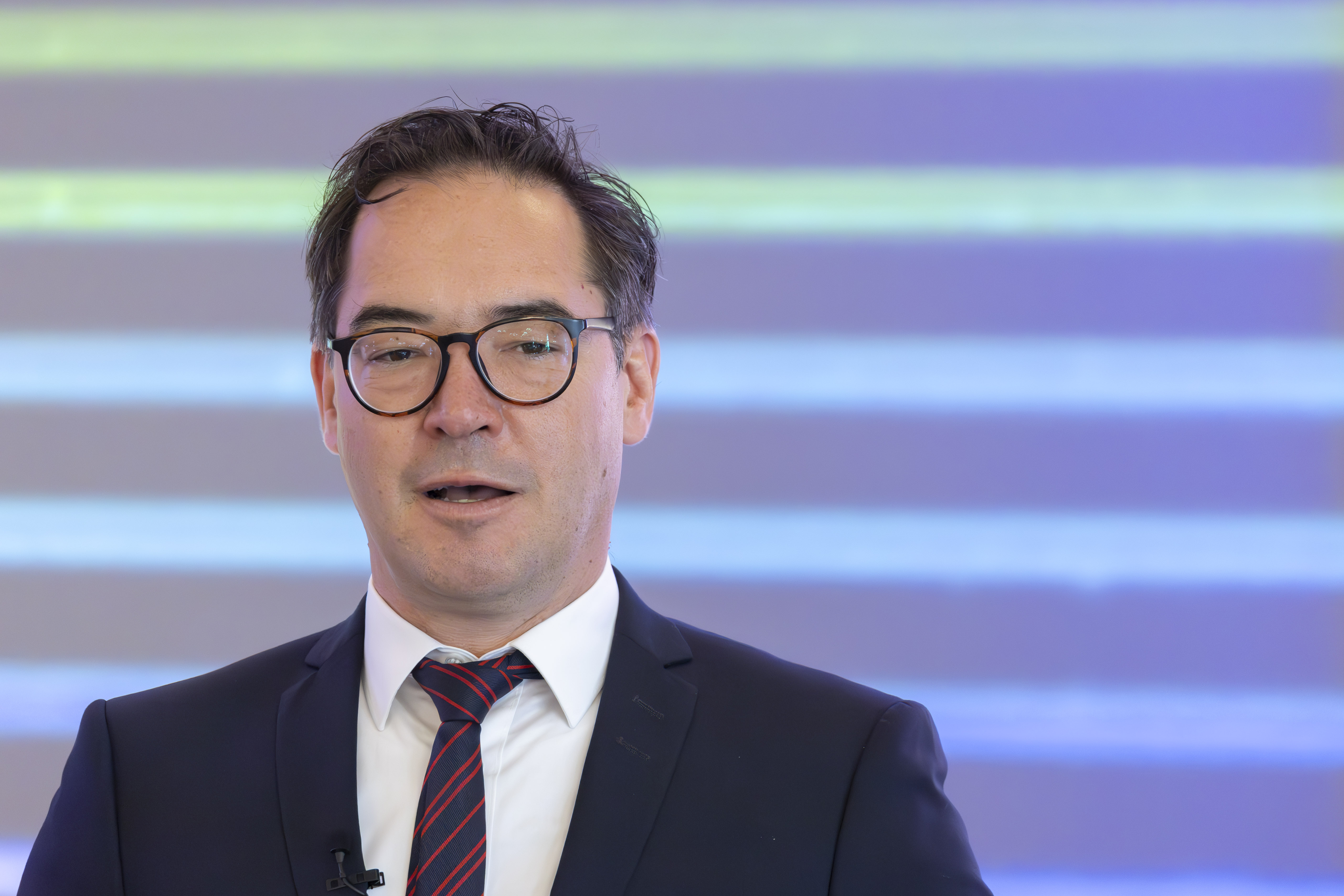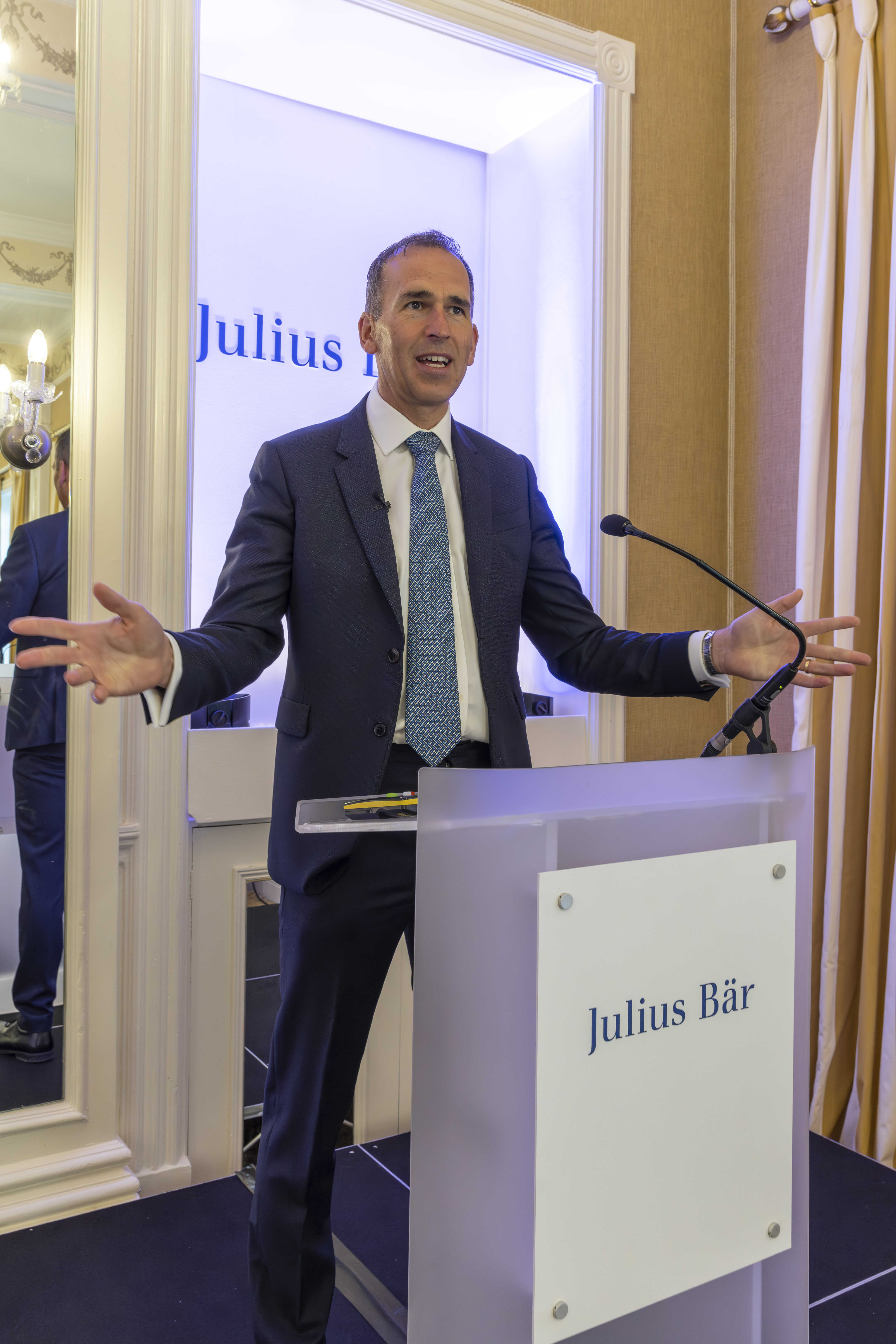


With the new Trump administration recently announced, economists are forecasting higher growth, inflation and interest rates for the US, a less positive outlook for Europe, and a mixed picture for China, an audience at Julius Baer’s biannual market outlook in Guernsey heard.
Julius Baer’s Chief Economist David Kohl came to the island to address an invited audience, offering insight into the global economic landscape, focusing on the United States, Europe, and China.
“What would the outlook for 2025 be without politics?” asked Mr Kohl, setting the tone for a robust analysis of the U.S. economy. Highlighting the country’s healthy balance sheets in both the private household and the corporate sectors, it is believed this will support economic growth even with more accommodative monetary policy, where central banks support growth by reducing borrowing costs.
Mr Kohl emphasised that the tariff proposed by the Trump administration on Canada, Mexico and China are likely a negotiation tactic aimed at tackling domestic priorities like healthcare reform and immigration control, rather than tools to generate fiscal income. The economic effects arise form heightened trade policy uncertainty that influences private investment decisions, particularly in Europe, where such indecision often leads to delays.

Pictured: David Kohl.
Julius Baer’s Chief Economist anticipates short-term strength for the US dollar, supported by robust nominal growth and looser fiscal policy, which we are seeing as part of the ‘post-election euphoria’. However, the audience was warned of long-term risks associated with the US budget and current account deficits, which could be problematic for its long-term stability. The Trump administration’s focus on deregulation, particularly in sectors like artificial intelligence and cryptocurrency, is expected to fuel further investment and keep the economy performing above potential.
The outlook for Europe is somewhat less positive, with Germany, historically the Eurozone’s economic engine, now representing a significant drag on European growth. Mr Kohl highlighted key challenges, including rising labour and energy costs and elevated policy uncertainty.
Despite this, the high complexity of Germany’s production processes offers some resilience, enabling exporters to maintain pricing power. Germany remains close to Japan on the Economic Complexity Index, emphasising its ability to navigate challenging economic conditions.
Overall, Europe faces mounting headwinds from domestic policy constraints and trade uncertainties. Supply chain disruptions, fuelled by geopolitical instability and climate change, are another concern, but we are seeing significant adaptation in global supply chains, such as the doubling the amount of container tankers being built.
China has reduced its trade dependency on the US, with exports to America now accounting for just 3.3% of GDP, down from 8%. This shift diminishes the potential impact of US tariffs on the Chinese economy. Instead, China has pivoted to investing abroad, transitioning from a destination for foreign direct investment to a significant global investor.
However, domestic challenges persist. Excessive private debt and a deflating real estate bubble continue to restrict growth, limiting the effectiveness of monetary policy adjustments. While lending rates have decreased, fiscal policy remains constrained by declining revenues, slowing the pace of recovery.
Despite these hurdles, China’s focus on establishing production capacities abroad reflects a long-term strategy to adapt to global economic shifts.
Addressing the audience, Craig Allen, Head of Investment Management at Julius Baer Guernsey, reflected on portfolio performance and market trends, emphasising the value of staying invested despite short-term fluctuations.

Pictured: Craig Allen.
“Cash is not the answer,” Mr Allen stated, acknowledging that while cash has performed well recently, it remains a poor long-term strategy. Reflecting on the challenges of 2022, which saw global portfolios impacted by the Ukraine war and rising interest rates, he highlighted the resilience of markets since the recovery began in October of that year. He noted that while managed portfolios are still catching up to cash returns since 2021, this gap is expected to close within six months, emphasising, “It's very rare to be behind cash for three years.”
Addressing the dominance of the US market over the past 20 years, Mr Allen described it as a headache for investors who find it difficult to outperform the S&P 500. However, he highlighted a notable shift in the US market since mid-2024, with smaller stocks experiencing a ‘Trump Bump’ and outperforming the top seven mega-cap tech companies that have driven US growth in recent years. This rotation, he said, signals a healthier and more balanced investment landscape.
While the US remains a leader, Mr Allen expressed disappointment in the lack of similar progress in Europe and emerging markets, where growth remains sluggish, other than a small renaissance in the UK briefly in the summer. Despite this, he encouraged diversification, balancing exposure between US and international markets, large-cap and small-cap equities, for better long-term returns.
Turning to equity valuations, Mr Allen highlighted the extreme overvaluation of US large-cap stocks, noting they are more expensive now than even during the dot-com bubble. His suggestion: shift focus to small-cap equities, which offer greater potential for returns.
Pictured top (l-r): Craig Allen, David Kohl, Jean-Luc Le Tocq.
Comments
Comments on this story express the views of the commentator only, not Bailiwick Publishing. We are unable to guarantee the accuracy of any of those comments.